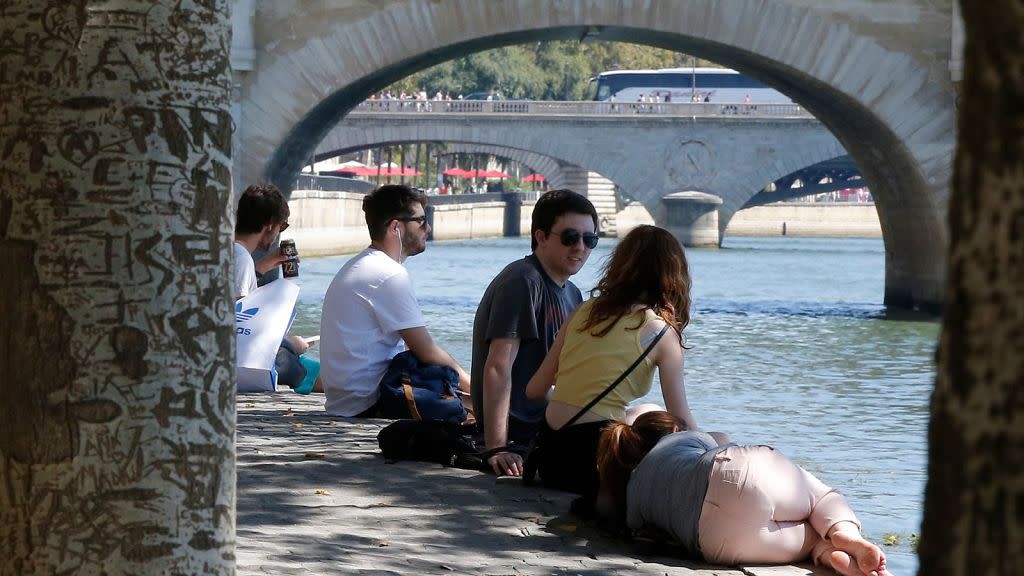Sewage pollution could jeopardise Olympic swimming events in the River Seine, NGO warns

Fresh doubts have been cast on the possibility of Paris hosting Olympic swimming events in its polluted River Seine.
Much excitement was generated by the announcement last year that the Seine will be open for public swimmers in 2025, after staging triathlon events this summer.
But water sampling by the European arm of the Surfrider Foundation has revealed that bacteria - including “pollution of faecal origin” - remains dangerously high.
“It is therefore clear that the athletes who will be taking part in the Olympic and Paralympic events planned for the Seine will be swimming in polluted water and taking significant risks to their health,” the nonprofit said in a statement last week.
Cycling is now more popular than driving in the centre of Paris, study finds
Privatisation, extreme weather and politics: How Britain’s waterways became an ‘open sewer’
Why is the Seine so polluted?
As romantic as it sounds, bathing in the Seine has been forbidden since 1923 due to danger from boat traffic and water pollution.
Paris’s iconic river is fouled by untreated wastewater. Treatment plants upstream of the river can dump wastewater when they are overwhelmed during periods of heavy rain.
Surfrider Foundation also blames malfunctions in the sewage network, as well as barges and riverside dwellings that aren’t connected to the wastewater networks.
1.9 million cubic metres of wastewater was discharged into the Seine in 2022.
How is the Seine being cleaned up?
To tackle these issues, the City of Paris has embarked on a €1.4 billion cleanup project.
It is building a 50,000 metre cubed rainwater storage basin upstream of the Austerlitz bridge. This underground reservoir - fed by a 700 metre long tunnel - is designed to hold water during storms, before releasing it back to the sewer system.
In 2018, the city said that all boats needed to be connected to Paris’s sewerage system, and has set about installing new connections in ports. But progress has been slow, and some boat owners say they have been unfairly targeted, compared to their land-dwelling neighbours.
The municipality has also been working on fixing connections from Parisian homes to the sewer system, as some has been sending their waste straight to the Seine or its tributaries.
Only one of 14 Seine water samples safe, according to NGO
However, these clean-up efforts don’t appear to have paid off yet, according to new analysis from Surfrider.
Of 14 samples taken by the NGO’s team over the past six months - on both dry and rainy days - only one was of ‘satisfactory’ quality.
The others had alarmingly high amounts of the faecal bacteria enterococci and escherichia coli, with e.coli levels four times too high on one day.
Though E. coli is present in human guts, some strains produce a protein that acts as a toxin in our bodies. This can cause anything from diarrhoea and vomiting to a potentially life- threatening illness as it spreads through the kidneys.
The bi-monthly samples are taken from the Pont de l’Alma and the Pont Alexandre III, the section of the river where the triathlon, marathon swimming and paratriathlon events are due to take place.
Surfrider also notes that the Directive on the Quality of Bathing Water (which determines whether Olympic waters are safe) does not take into account many other types of pollution, including chemical pollutants.
Will the Seine be ready for the Olympics?
Responding to the Surfrider study, the City of Paris has pointed out that the samples were taken during rainier months when pollution is more likely.
Officials said they are “surprised” by the timing of the report. “The Seine is not intended to accommodate swimmers from mid-September to June,” it said in a statement. For “safety reasons,” it will only be swimmable in the summer.
The Austerlitz Basin also won’t be functional until 2 May, it added.
Though the president of the Paris Organising Committee has expressed his confidence that the Seine will be ready in time, he has also acknowledged there is still some uncertainty around the events.
“We can postpone for rainy conditions,” Tony Estanguet said during a conference in the UK last week. There could be “a final decision where we could not swim,” he added, “it’s part of the rules of the International Federation. It’s what we want to avoid, of course.”
The rules he was referring to state that the event can be made into a duathlon (running and cycling, with no swimming) or cancelled if the water is deemed too polluted.
Cutting the swimming from the triathlon is something that athletes obviously want to avoid. Ana Marcela Cunha, Brazil’s gold medal winner of the Tokyo 2020 women’s marathon 10-kilometre swim, told the AFP news agency that “we need a plan B in case it’s not possible to swim in the Seine.”
The river is also set to play a major role in the Olympics opening ceremony, with teams sailing down the Seine to launch the Games on 26 July. But this “world first” (the event traditionally takes place in the host’s main stadium) is under review for different reasons, Macron revealed this morning.
“Plan Bs and Cs are in place” if authorities believe there is a heightened security risk to athletes travelling down the river, he said.


